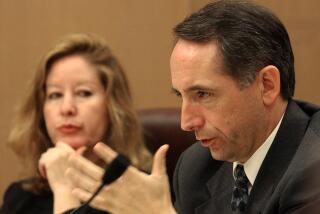Lawyer Wins Back Prison-Visit Rights
- Share via
San Diego criminal defense lawyer Alex Landon, who sued state prison officials after he was banned from visiting the prisons, has won the unusual lawsuit.
The ban, prompted by unsubstantiated allegations tying Landon to a 1972 Chino jailbreak, was unjustified and unfairly kept Landon from visiting clients behind bars, a Marin County Superior Court judge ruled. No reliable evidence links Landon to wrongdoing, the judge said.
The ruling, issued last November, was not made public until Wednesday. It means that Landon, who has built a practice dedicated to the rights of poor people charged with crimes, now can visit one of those clients on Death Row at San Quentin--David Allen Lucas, convicted in 1989 in San Diego of three murders.
“It was obviously the right result,” said Landon’s lawyer in the case, San Francisco attorney John T. Philipsborn. “The only regret I have is that it took a while for us to get it.”
Landon said Wednesday that he was gratified that the ban, which he has long maintained was based on political considerations, has been struck.
Referring to the lawsuit, Landon said, “It is something that should not have had to be done. But it was necessary to take the action to indicate that my rights were violated. And to ensure that my rights would be respected.”
The ban, instituted in 1973, received new attention in 1988, when San Diego County supervisors were pondering whether to award the nonprofit group Landon then headed a three-year, $40-million contract to represent indigent criminal defendants. Early in 1988, Landon formally asked prison officials for the first time to lift the ban.
About the same time, then-Assemblyman Larry Stirling (R-San Diego), now a San Diego municipal judge, sent a pack of documents to county supervisors that told of the ban. In May, 1988, the board reversed its decision to award the contract to Landon’s group and voted instead to launch an in-house public defender’s office.
The ban stemmed from the Oct. 6, 1972, escape of Ronald Beaty from the California Institution for Men at Chino. Beaty escaped when a vehicle being used to transport him from a San Bernardino court hearing was run off the road. One guard was shot to death and another was wounded.
In 1973, Beaty, who turned state’s witness and helped convict others implicated in the plot, said Landon had smuggled hacksaw blades in to him and had ferried out escape plans. Beaty later reversed himself and said variously that Landon had nothing to do with the escape or had carried out the plans unwittingly.
Landon, who was representing Beaty in a civil rights matter at the time, consistently has denied any involvement in the escape.
A 1973 investigation by the San Bernardino County district attorney’s office ended with no criminal charges filed against Landon. The State Bar of California also conducted an inquiry and found no basis for disciplinary action.
On June 25, 1973, however, prison officials imposed the ban, concluding that Landon had smuggled blades into the prison and had carried out an escape plan, Landon alleged in the Marin County lawsuit.
In 1988, about the time San Diego County supervisors were deciding who should run the local system of indigent defense, the San Bernardino County district attorney’s office and the state bar reopened their investigations into the escape.
The D.A.’s investigation closed in October, 1988, and the bar associations in May, 1989, both with announcements that there was no basis for action against Landon.
After asking formally in 1988 that the ban be lifted, Landon was told in a three-sentence July, 1989, letter that it would continue.
That denial prompted Landon’s lawsuit, filed in Marin County, where San Quentin is situated. Landon said in the suit that he needs to be able to confer with Lucas, who was convicted for three throat-slash murders, on his death-penalty appeal.
Prison officials consistently have declined to explain the ban or to afford Landon a hearing. In his decision, Marin County Superior Court Judge William H. Stephens said their stance denied Landon his basic right to due process, meaning a hearing to protest the ban.
Stephens also said prison officials had acted arbitrarily in imposing the ban. Beaty’s testimony about Landon was “of extremely poor quality,” the judge said.
Landon said Wednesday that he has not yet visited Lucas but plans to do so.
More to Read
Sign up for Essential California
The most important California stories and recommendations in your inbox every morning.
You may occasionally receive promotional content from the Los Angeles Times.










